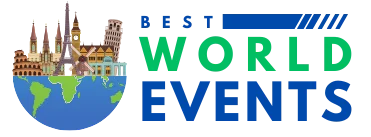CU Boulder’s 76th annual Conference on World Affairs facilitates important discourse
Flags decorate the walkway to Macky Auditorium for the 2024 Conference on World Affairs. (Lucy Adlen/CU Independent)
Last week, the University of Colorado Boulder hosted the annual Conference on World Affairs. From April 9-12, CWA hosted conversations on a wide array of global issues in the University Memorial Center Ballroom.
Called “a week-long extravaganza of discussion and debate,” by the New York Times, the 70-plus panels brought to light emerging conversations in the political, economic and human rights landscape.
CWA aims to bring diverse voices to complex global conversations. This year’s event upheld that tradition as students were encouraged to engage with the panelists and experts in attendance.
“Students challenging people who are further down the road in their careers is an extremely productive thing for both parties. As a student, a wonderful way to learn is to challenge people and make use of their expertise,” said Rebecca Buckwalter-Poza, a panelist featured during a presentation entitled “Immigration on the Southern Border: Broken Borders, Shattered Hearts.”
The panel tackled topics related to immigration and national security, such as how the university should handle discussing immigration policy in a classroom setting.
“Contextualizing immigration law within international law would really be beneficial to the conversation to understand– outside of the context of just the United States, or just the U.S.-Mexico border– what the principles are that animate law around the world surrounding immigration,” said Buckwalter-Poza.
A number of other panels within the conference focused on climate action. Speakers emphasized the importance of bold and immediate action to mitigate the impacts of global warming and climate change.
In the panel, “All’s Whale that Ends Whale: Conserving our Wildlife Heritage“, speakers combined their expertise on climate change and emerging technologies such as genetic engineering.
“Technology is a tool. Technology is not the problem. Science is not the problem. It’s what we do with those things that is the problem,” said speaker Ted Schmitt. “We are not going to stop people from seeking knowledge, and that is what science and technology is. Those are good human activities, but what we do with the outputs of those activities is the problem.”
Prioritizing accessibility and community engagement, the event was free and open to the public. To fuel participant engagement, panelists took questions from audience members, including the many CU Boulder students who attended.
“It is great that the conference prioritizes questions from students, and is one of the things that makes me really want to come back,” said Buckwalter-Poza.
Contact CU Independent Staff Writer Satori Griffith at Satori.Griffith@colorado.edu.













